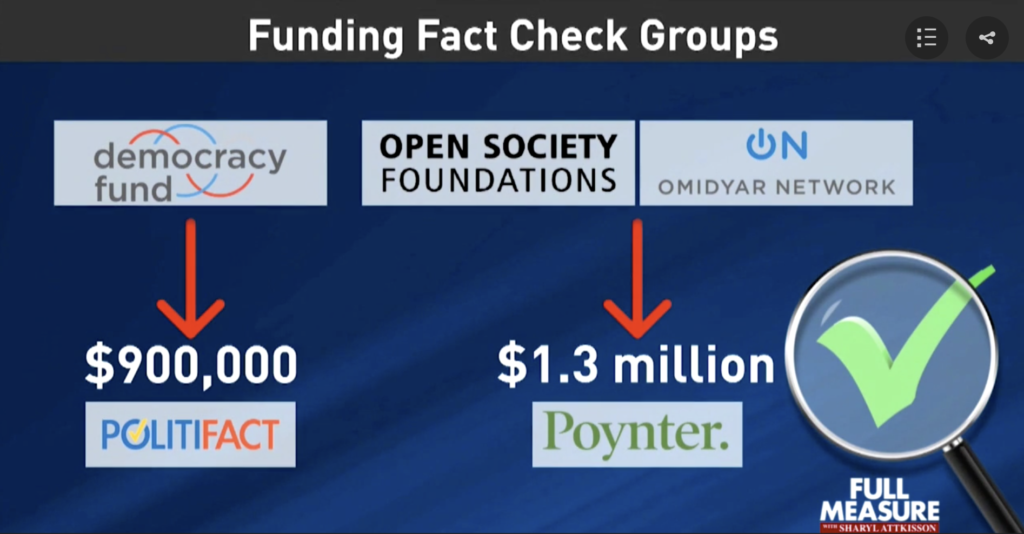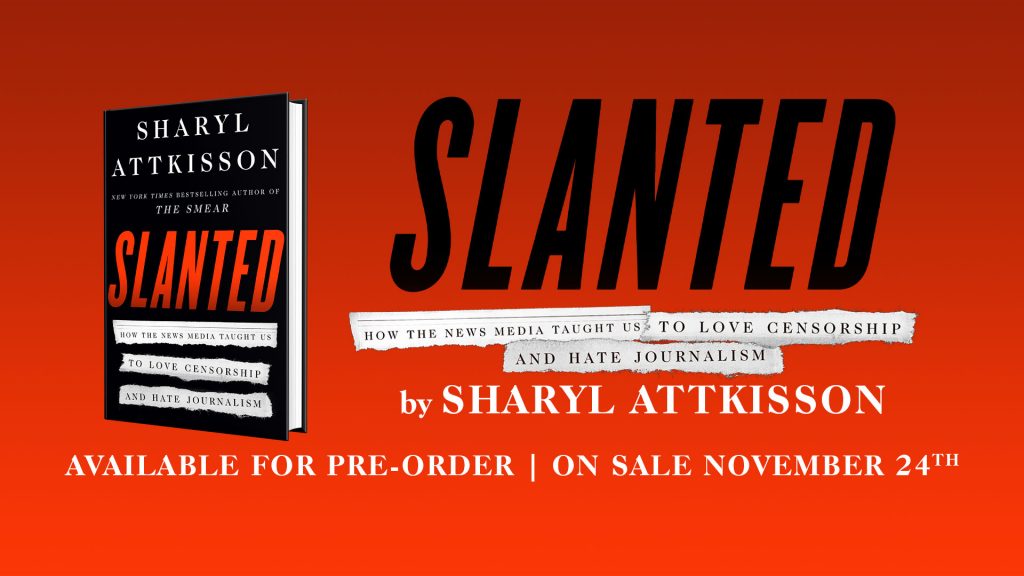
Watch at the link below. Transcript follows.
http://fullmeasure.news/news/follow-the-money/big-tech-censorship-part-2
It is no accident that so much Big Tech fact checking and labels appeared in the lead-up to the 2020 election. Millions poured into the efforts behind the scenes. We continue our report on Big Tech censorship by Following the Money.
Whistleblower Zach Vorhies says his bosses at Google were devastated by President Trump’s unexpected victory. Then-CEO of Google’s parent company Eric Schmidt was a major donor and volunteer for Hillary Clinton.
Beyond political activism, Big Tech also stepped up control over public information. When coronavirus hit, Google directed searches to the World Health Organization, the very group criticized for “let[ing] China take charge” and praising the communist nation where the pandemic reportedly started. Then came the mask disaster. Taking cues from public health guidance last March, many declared face masks “are NOT effective.” And Facebook banned ads “selling medical face masks.”
But if public health experts are now correct in their turnabout on masks, it was Facebook and fact checks that spread misinformation and cost lives.
Cindy Cohn heads up the Electronic Frontier Foundation, which supports free speech and open access to information.
Sharyl: Do you worry that information available to the public that was once fairly unfettered online is becoming increasingly controlled or even manipulated by those who are able to, whether it’s the tech companies or other third parties?
Cindy Cohn: I think we’re making, we’re seeing visibly what used to happen kind of invisibly. I mean, most people knew that when you picked up your local paper, what you saw was what whoever owned your local paper wanted you to see. Now we’ve got these sophisticated algorithms that are deciding what people see as well as the platforms themselves. And I think it is making some people uneasy.
By one count, fact check groups more than quadrupled in number over five years from 44 to 195. It’s a multi-million dollars industry that stands to benefits certain interests depending on how the fact checks shake down.
Today, Facebook and Google are major funders of news organizations and fact check efforts spending hundreds of millions of dollars.
Republican Lindsey Graham questioned Facebook’s Mark Zuckerberg about who exactly determines their truth.
Sen. Graham (November 2020): When it comes to fact-checking, would you give us a list of people you use to fact-check?
Mark Zuckerberg (November 2020): Yes, we work with a number of independent organizations that are accredited by the Poynter Institute, and they include Reuters, the Associated Press, Aegence France Presse United States, USA Today, factcheck.org, Science Feedback, PolitiFact, Check Your Fact, Leadstories and the Dispatch in the United States.
But no matter how well meaning, critics say Facebook’s list of trusted sources is rife with conflicts of interest. For example, Poynter Institute’s PolitiFact has received millions of dollars from groups that support “re-imagining capitalism,” counting illegal immigrants in the U.S. census, and changing presidential elections from the electoral voting system to a popular vote.
One group, Democracy Fund, gave PolitiFact $900,000 and is also a major funder of anti-Trump political efforts. $1.3 million for Poynter’s International Fact-Checking Network came from the left-leaning George Soros “Open Society Foundations” and the Omidyar Network.
Like other groups, Poynter insists its fact checking is independent and donors have no influence.
Another of Facebook’s trusted sources, Science Feedback, was used to discredit a documentary examining alleged coronavirus links to a lab in Wuhan, China. Turns out Science Feedback relied on a US scientist who worked at the Wuhan lab. Science Feedback also takes positions siding with climate change advocates and the vaccine industry.
What about the news organizations Facebook counts on to fact check? Collectively, they’ve made plenty of their own reporting errors. USA Today misreported on Melania Trump’s immigration status and falsely quoted Trump as saying Turkey invading Syria was “not our problem.”. Aegence France Press claimed 100,000 migrant children were in detention under Trump. But the figure was from 2015 under Obama. AP said media trust had fallen under Trump, mistakenly quoting an old poll actually done under Obama. Incorrectly reported conservatives funded the anti-Trump dossier, it was the Clinton campaign and Democrats. And wrongly reported that Trump’s pick for CIA Director, Gina Haspel, had waterboarded and mocked a terrorist dozens of times. But she wasn’t even there.
Vorhies says his tipping point came when Google CEO Sundar Pichai told Congress the company doesn’t blacklist websites.
Sundar Pichai (December 2018): We don’t manually intervene on any particular search result.
Zachary Vorhies: And that’s when I saw that Sundar Pichai was lying to congress by saying that they don’t use blacklists. And I was sitting there as a full-time employee saying, “They don’t use blacklists?” And I went and typed in blacklist and literally came to a blacklist that was named “blacklist.”
Vorhies resigned from Google and blew the whistle. About the same time, another former insider, Mike Wacker, also exposed Google’s blacklists. Which prompted a command performance of Google’s CEO before Congress.
Rep. Matt Gaetz (July 2020): So help us understand the inconsistency. There is either a manual component or there is not a manual component. Which is it?
Pichai(July 2020): For creating those lists, that process can involve a manual
Rep. Gaetz (July 2020): Okay, great. Well, that is sort of the concern that I have. You said that one of the reasons you maintain this manual tool is to stop election interference. I believe it is, in fact, your company that is engaging in election interference.
Pichai (July 2020): Congressman, with respect, I strongly disagree with that characterization. We don’t approach this work with any political viewpoint.
Vorhies: And they’re telling congress right now that “No, we don’t use political bias or we don’t filter on political ideology.” And that’s just not true.
If Big Tech developed a heavy hand after Trump’s election, it became a sledgehammer the final weeks of the 2020 campaign. Twitter labeled and censored many of President Trump’s tweets. It censored a New York Post expose on Joe Biden’s son. And post-election, YouTube banned videos disputing Biden’s victory. Facebook’s Zuckerberg, Google’s Pichai and Twitter’s Jack Dorsey declined our interview requests.
In testimony to Congress, they vigorously defended their practices, saying they’ve responded to calls to stop dangerous misinformation and fake news.
Jack Dorsey (November 2020): More than a year ago, the public asked us to offer additional context to help make potential misleading information more apparent. We did exactly that. Applying labels to over 300,000 tweets from October 27 to November 11.
Mark Zuckerberg (November 2020): We will always be working hard to minimize the harm. In the same way that a city will not minimize all crime. You try to reduce it and have it be as little as possible.
Sharyl: What’s wrong with a company trying to, as they might say, be responsible and make sure that irresponsible or unfounded information and conspiracies don’t make their way to a place where the public can easily see them?
Vorhies: The problem is that they are a monopoly. And the thing is is that if they decide that they’re going to put their finger on the public narrative, that’s going to be meddling in the election.
Congress is threatening to punish Big Tech by stripping them of legal protection they have under a provision of a law called Section 230.
Sharyl: But then the government steps in and says, “Maybe we will help.” Doesn’t that add, though, another layer of potential complication?
Cindy Cohn: Absolutely. I think one of the, just because you have a problem doesn’t mean that every solution is the right one. And I think we could really jump from a fireplace into a fire if we then decided that we’re going to let who was ever in charge of the government decide what we see.
Sharyl (on camera): Both parties say they want to do something about Big Tech— but don’t agree on the problem. Some want less censorship; others are pressing Big Tech to be more aggressive in controlling what they see as damaging information.

Fight improper government surveillance. Support Attkisson v. DOJ and FBI over the government computer intrusions of Attkisson’s work while she was a CBS News investigative correspondent. Visit the Attkisson Fourth Amendment Litigation Fund. Click here.







